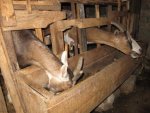Sue Auma
Author

Goat versus Cow milk: For decades, Johnson Maringa watched from the sidelines as farmers turned their agricultural ventures into profitable businesses.
As an accountant with the Agricultural Development Corporation (ADC) he admired the zeal and success of farmers whom he constantly interacted with, and hoped that after retirement in 2006, he too would try his hand at agribusiness.
Nine years later, Maringa sits at the helm of Mountain Dairy Farm Company which processes and sells yogurt made from goat milk. He supplies this unique but highly sought after product to major supermarkets in five counties.
“After my retirement from the ADC, I moved back to my rural home in Kiawairigi village in Mathira Constituency, Nyeri County, and began dairy farming on my five-acre farm,” Maringa says.
He had high hopes that selling milk from his four cows would comfortably support him and his wife in retirement, but he was disappointed.
“I soon realized dairy farmers are at the mercy of brokers who often buy a liter of milk at a paltry Sh20 which is inadequate to cover the costs of production,” he says.
The former accountant vowed to find an alternative way to increase his earnings from dairy farming.
He embarked on increasing his milk production from 10 to 25 liters per day by focusing on zero-grazing and preparing his own feeds.
“The meager pay from my milk left me disillusioned. That is when I started to inquire about the value of various milk products in the market,” Maringa says.
His market research led him to discover that while raw milk was retailing at Sh20 per liter, one liter of yogurt was retailing at more than Sh100.
“I decided to start making yogurt production line in my home in 2010 by registering Mountain Dairy Farm. I got the necessary Kenya Bureau of Statistics certification the same year,” he says.
With little marketing experience, Maringa chose to sell his yogurt to his neighbors and the local church Sunday school.
Soon, more people started knocking on his door to buy his yogurt. Realizing that the drink was becoming popular, he decided to deliver it to local shops at neighboring shopping centers and eventually expanded his niche to major towns in Nyeri, Kirinyaga, Embu and Laikipia counties.
Now a confident dairy farmer, Maringa decided to try out dairy goat farming. After conducting market research on dairy goat farming two years ago, he realized it had huge potential.
“While cow milk is readily available, the scarcity of goat milk in the market makes it a lucrative business. I visited several shops in Nairobi and discovered that half a liter of goat yogurt costs Sh300,” he says.
With the newfound zeal, he decided to diversify his yogurt making business by buying pedigree goats. He also joined the Dairy Goats Association of Kenya whose headquarters are in Wambugu Agricultural training center in Nyeri town.
“Currently, I have six goats which produce two and a half liters of milk each daily. I have had to contract local farmers to deliver more goat milk in order to meet the demand for the goat yogurt,” Maringa says.
Every day, he and his six employees wake up at 3 am to process 30 liters of goat milk and 150 liters of cow milk into yogurt.
Each liter of milk produces a liter of yogurt, which he then packs into 250ml, 500ml, and one-liter bottles.
Maringa sells one bottle of goat yogurt at Sh250 while one liter of cow yogurt retails at Sh 120.
“I earn Sh120,000 per month from goat yogurt and Sh72,000 from cow yogurt. The work is exhausting but its rewards have been worthwhile,” he says.
The nutritional value of goat milk and yogurt makes it ideal for those who are health conscious.
“I believe the future of my business lies in dairy goat farming, the cost of production is low and it has high returns. The demand for unique, local and more nutritious products is high in the Kenyan market. In the next five years, I will have to dedicate all my efforts to dairy goat farming in an attempt to fill the gap,” he says.
Maringa hopes more dairy farmers will embrace value addition which he says will change their fortunes.
Article source - Biznakenya
